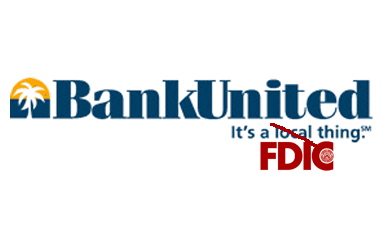 Normally the FDIC waits until Friday to shutter banks, but in a break with recent precedent it opted to beat the holiday rush and announce the closing of Florida thrift BankUnited on Thursday. This is the second costliest failure for the FDIC in the financial crisis, the Wall Street Journal notes, and the 34th bank failure of the year.
Normally the FDIC waits until Friday to shutter banks, but in a break with recent precedent it opted to beat the holiday rush and announce the closing of Florida thrift BankUnited on Thursday. This is the second costliest failure for the FDIC in the financial crisis, the Wall Street Journal notes, and the 34th bank failure of the year.
The biggest independent bank in Florida, BankUnited was another victim of overextending itself in the housing market.
The FDIC estimates that its dwindling insurance deposit fund will take a hit of $4.9 billion. But the bleeding might not end there. As part of a deal to sell the bank's assets to a private equity team, the FDIC agreed to share in losses on the bank's books up to $10.7 billion, so it's possible that the estimate could eventually be revised upward.
The costliest failure to the FDIC came from another thrift, IndyMac, which failed last July. IndyMac ended up taking a $10.7 billion bite out of the FDIC's insurance fund.
As of December 31, the FDIC had only $18.9 billion left in the fund. It is planning to assess extra fees on member banks to forestall a taxpayer bailout.
Like IndyMac, BankUnited was regulated by the Office of Thrift Supervision. Ironically, the regulator got slammed by the Treasury Department's inspector general yesterday in a report about a backdating scandal. The OTS allowed several banks -- including BankUnited -- to count capital they didn't have in order to appear stronger in regulatory filings.
BankUnited's failure was expected, and even overdue. In April, after months of wrangling, the OTS issued a cease-and-desist order against the bank demanding that it raise more capital or sell itself. The FDIC delayed closing the bank while it arranged for a buyer. The winning bidder for BankUnited was a group led by John Kanas, the former head of North Fork Bank. Joining him were vulture investor Wilbur L. Ross and the Carlyle Group, among others. As part of the deal, the group promised to recapitalize the bank with $900 million in new equity.



